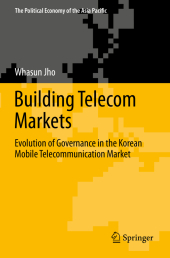 Neuerscheinungen 2013Stand: 2020-01-07 |
Schnellsuche
ISBN/Stichwort/Autor
|
Herderstraße 10
10625 Berlin
Tel.: 030 315 714 16
Fax 030 315 714 14
info@buchspektrum.de |

Whasun Jho
Building Telecom Markets
Evolution of Governance in the Korean Mobile Telecommunication Market
2014. 2013. xviii, 222 S. 3 SW-Abb., 15 Tabellen. 235 mm
Verlag/Jahr: SPRINGER, BERLIN; SPRINGER NEW YORK; SPRINGER 2013
ISBN: 1-489-99778-4 (1489997784)
Neue ISBN: 978-1-489-99778-4 (9781489997784)
Preis und Lieferzeit: Bitte klicken
This book examines the uniqueness of Korean regulatory reforms of the mobile telecom sector. It evaluates the influence of markets and technologies on telecom market liberalization and repudiates the single neo-liberal model of market-oriented reform.
The mobile telecommunication industry has been one of the fastest growing industries in the global economy since the late 1990s. As the first country to offer commercial Code Division Multiple Access (CDMA) cellular service in the world, Korea was able to jump right into the digital mobile markets, enhancing its status as a leading manufacturer of mobile equipment. While the growth of the telecom industry occurred with the emergence of worldwide market-oriented regulatory reform and liberalization in telecommunications, the state-market relationship in Korea evolved from state monopoly toward "centralized governance" and later toward "flexible governance," which is substantially different from "liberal governance" of the US. This book examines the uniqueness of Korean regulatory reforms of the mobile telecommunication sector, and argues that the market-oriented regulatory reform and liberalization should be explained by focusing on the interactions among the state, the private sector, and international political economic environment. It will appeal to scholars and policy-makers alike concerned with market regulation, Asian development and political economy.
1. Research Questions.- 2. Theoretical discussion.- 3. Global Challenges in Telecommunication.- 4. Overview of the Korean Response: From Monopolies to Liberalization.- 5. The Emergence of Centralized Governance in the Korean Mobile Market.- 6. The Emergence of Flexible Governance under the WTO Regime.- 7. Conclusion.


